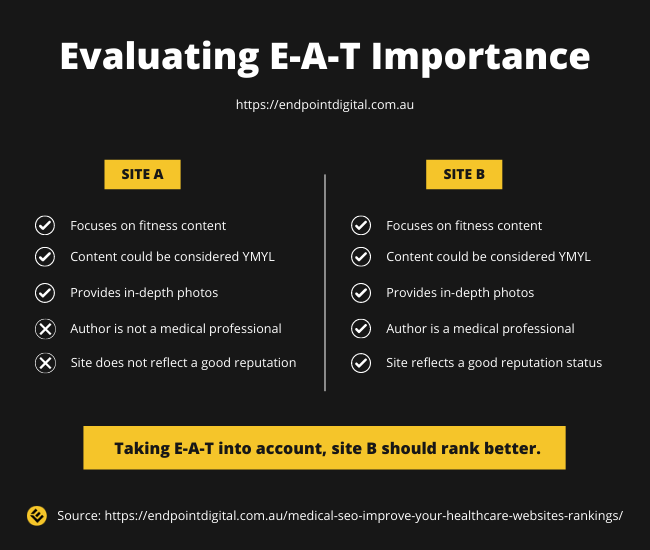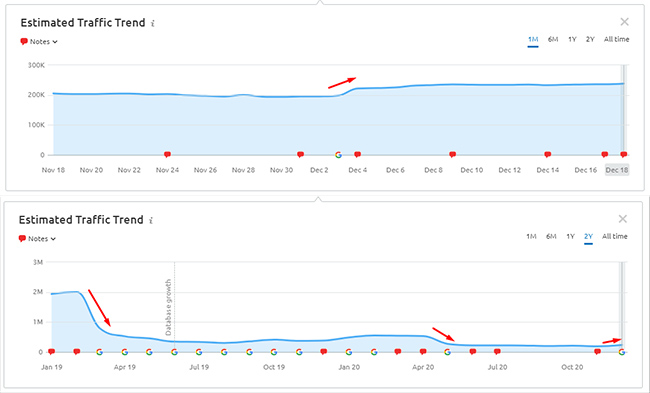Healthcare is one of the biggest industries in the world and for obvious reasons – health is fundamental to living a long, happy and fruitful life.
SEO (search engine optimisation) is a highly sought after service for medical-based websites, as a vast majority of people take to search engines to solve their health-related symptoms, or at least get an understanding of what may be occurring before seeing a medical professional.
Think about it for a second – any time you’ve had a spot appear on your body or you’re feeling a little under the weather, I guarantee that you’ve made your way to a search engine before a doctor’s office at least once.
Ranking a website for high-volume, highly sought-after keywords in any search engine is no easy task and medical SEO is no stranger to this concept, so it pays to understand how search engines make use of healthcare-related content so that it can be surfaced to the most relevant users.
In order to ascertain how to rank a medical-related website using organic SEO techniques, we first must discuss how Google evaluates this specific content and how you can get ahead of the curve.
Contents
Firstly, What is Medical SEO?
For the sake of this article, we’ll explain what medical SEO is for sites that post healthcare-related content as opposed to general practitioner and physician websites.
When it comes down to ranking a medical-related website for hospitals, practitioners and doctors, the fundamentals of local SEO are still valid to achieving great results, but we want to explore the nitty-gritty industry of healthcare that is content-heavy websites that can’t seem to experience any sort of organic growth whatsoever.
In its simplest terms, medical SEO is the process of ranking a healthcare-related website for high-volume, desirable keywords that will bring long-lasting organic traffic – essentially what SEO is down to its core.
Now that you understand what healthcare SEO is, it’s time to understand how search engines like Google make use of this content.
Evaluating Your Healthcare Content: Search Engines
The most important thing to note about medical related content is that it’s held to a significantly higher standard than most forms of content out there.
Given that Google’s index contains billions of pages, there’s a guarantee that most topics (regardless of industry) have been written about 10,000 times over and you’re actively competing with those websites for the illustrious top 3 positions in the search results pages.
Search engines like Google have guidelines they use to evaluate the quality of not only your content, but your website as a whole so keep that in mind when identifying areas of improvement on your website – don’t just fix one page and expect the needle to move.
SEO is best done when it’s viewed holistically, and as such, it’s important to note why healthcare SEO is held to such a high caliber compared to most other industries.
Understanding The Concept of YMYL
YMYL is short for “Your Money or Your Life”, which refers to pages or topics that have the ability to impact an individual’s future happiness, health, financial stability or safety.
Not only does healthcare fall under this criteria, but you have other prime examples as well, such as financial content that may provide advice on investments, banking, loans, insurance, retirement planning and so forth.
Any content that is likely to impact the reader’s wellbeing on one of these four factors is likely to be considered YMYL and as such, the webmaster needs to exercise extreme caution when creating content that is deemed YMYL.
In recent times, Google has indirectly increased their stance on eradicating low-quality YMYL pages from search results, and as such, bloggers in the healthcare industry need to be increasingly wary that if their content is not backed by a medical professional in any manner, it could become classified as low-quality content but we’ll discuss this further in the article.
Industry Saturation
This concept has less to do with how search engines evaluate medical content, but more so, what you need to do to stay ahead of your competitors who are following your every footstep.
When it comes to industry saturation, there are very few left in the SEO stratosphere where it doesn’t require much effort, time or link building to build tangible results – especially in 2022.
Now when it comes to healthcare, it is clear where the obvious winners may lie. Let’s start with an example.
Site A is a healthcare-related site that posts content about fitness. They provide workout routines, supplementation and diet advice, as well as how to perform exercises with photo examples. The main content writer on this site is not a healthcare professional but is a casual lifter with a solid understanding.
Site B is also a healthcare-related website that posts all of the same content as site A, but their authors are accredited healthcare professionals with backgrounds in kinesiology, nutrition and sports science.

At a base level, there is an obvious difference between the expertise and trustworthiness of site A and site B and you would expect site B to rank better in comparison.
Of course, there are other obvious factors at play such as backlink profile, content quality and 200+ other ranking signals, but expertise plays a vital role in YMYL content.
If you didn’t know that being an expert on a topic pays dividends by now, perhaps this next segment will help you see more clearly.
Experience, Expertise, Authoritativeness, and Trustworthiness (E-E-A-T)
E-E-A-T is one of the most important acronyms to remember when assessing your content’s quality and relevance to a particular audience. Search engines such as Google use this concept to determine a page’s quality, so it is a consideration you must take note of.
To get an understanding of how Google uses E-E-A-T, we’ll break down what each letter is used for and specifically, how it applies to the healthcare industry.
- Experience: Refers to the extent in which the content creator or author, has substantial or required first-hand experience required for the topic.
- Expertise: The expertise of the author who has created the specific, main content in question.
- Authoritativeness: The overarching power that this author has to create this main content and the overall authority of the site itself (through quality backlinks).
- Trustworthiness: The credibility that the author has to create this main content and the trustworthiness of the site (trust signals include websites that are SSL secure, malware-free, no sneaky or deceptive pages).
Essentially E-E-A-T can be boiled down to your content creators being accredited and trustworthy enough to write content that they have significant expertise on, for a website that is equally trustworthy and authoritative in comparison to other related websites.
If you’re wondering how this concept ties directly into medical SEO, here is a quote from Google’s Search Quality Evaluation Guidelines:
“High E-E-A-T medical advice should be written or produced by people or organizations with appropriate medical expertise or accreditation. High E-E-A-T medical advice or information should be written or produced in a professional style and should be edited, reviewed, and updated on a regular basis.”
It isn’t always easy to ascertain what specific topics in the healthcare niche fall under YMYL, but it is best to play it safe when writing content that could affect a person’s long-term wellbeing.
If you’re writing a post about performing deadlifts, take into consideration how you could potentially mislead your users if you’re posting photos that don’t showcase the right form, you’re posting bad examples of weight in comparison to rep ranges or you’re simply not including the right medical information about rep ranges for hypertrophy, strength and endurance which can lead users astray from their personal fitness goals or potentially set them up for injury.
How do I improve my E-E-A-T?
For starters, let’s assume that you’re not a medical professional, but you’re still writing medical-related content because you have some experience in doing so.
Does this mean you’re not able to rank on search engines like Google? No. Is it unlikely? Probably, if these evaluation guidelines are anything to go off.
The first step to improving your E-E-A-T is to quite literally improve your E-E-A-T. Spend time to invest in your content writing, especially if it is a dominant feature of your website. Take the time to seek out medical professionals, interview them if possible, and have them feature in your website’s content.
When your content is good and backed by medical professionals, it also has the ability to attract quality links in a natural manner which is a core component to good SEO rankings.
There is a beneficial life-cycle to preparing good content in that it will stay forever evergreen content if the facts are not likely to change, you have the insight of accredited professionals and you have an understanding of how to market your content effectively.
For more basic signals to improve your expertise, authoritativeness and trustworthiness, include the following characteristics on your website and its content:
- Include helpful, descriptive titles that showcase what the content is about before a user clicks it
- Provide appropriate context about who is responsible for the website and make sure it’s easy to get in touch.
- Include an expert author bio for medical professionals who either author or feature in your content, including any relevant links to their accreditations and achievements.
- Make sure your page is entirely functional. If you have videos, make sure they’re still active and load quickly. For images, make sure they are visually appealing and contain correct information.
- Ensure all information is factually correct. This is a no-brainer, but sometimes content isn’t subjective. When you’re writing content that relies on facts, you absolutely need to triple check them.
- Include indicators of your reputation. Reputation ties in with authoritativeness, so if you have independent reviews of your content, you should make sure they are easily obtainable by users.
- If your website is a blog that allows comments or a forum-based website, actively moderate all comments. Forum based websites are notorious for people giving out advice without having any expertise, authoritativeness or trustworthiness to do so and in order to keep up quality, you should monitor them closely.
It goes without saying that the first and most vital step to improving your E-E-A-T is to improve your overall content quality and trustworthiness.
Can I Still Rank My Medical Website If I’m Not A Healthcare Expert?
The short answer is probably, but there are a lot of variables to consider when trying to rank any website, let alone a healthcare one in popular search engines like Google
Affiliate marketing is more popular than it’s ever been and it’s always enticing to create a website about a passion you might have, but lack the credibility and professional pedigree to cement yourself amongst the top rated, highly authoritative websites.
The problem with healthcare is that it’s going to get increasingly hard to rank for desirable keyphrases that bring organic traffic given that Google is going to continue to push for high standards regarding YMYL content.
E-E-A-T is one of the most important guidelines that search evaluators use for your content, so you may consider it an indirect ranking factor when it comes to your overall content strategy.
Again, just to clarify, we’re not necessarily talking about local doctors office websites, dentists, general practitioners or any medically endorsed facility – these organisations all represent highly qualified individuals and those websites fall under traditional SEO.
Healthcare websites are generally content-heavy and have some sort of advertising tie to it, whether it be through AdSense, affiliate marketing, banner marketing or even some eCommerce affiliation.
There are no guarantees in life and this rings true for marketing, but it’s important to gather some insight about how and why medical SEO is going to continue to become increasingly difficult.
A Medical SEO Case Study:
Glenn Gabe of GSQI shared some interesting results from the December 2020 core update, noting that several affiliate sites that focused on healthcare and medical topics saw volatility in their rankings and search visibility.

Source: GSQI Interactive
Previously, this site had upwards of 2 million+ organic visitors and over time, it continued to drop to less than 300k organic visitors.
One of the most important notes about affiliate marketing websites that are healthcare-related is the fact that there is a “fine line between selling and educating”.
It’s difficult to ascertain what is more important to the webmaster – providing users with good quality content or making passive income through affiliate links?
For some additional context, Google released a core update late in 2018 that was ultimately dubbed “The Medic Update” by several SEOs who discovered that health-related websites suffered from drops in traffic more so than any other industry.
It was believed that the update was targeted towards YMYL websites, however, medical/health sites stood out like a sore thumb.
It’s painfully obvious that these sites will continue to experience volatility over time given they are held to such a high standard, so caution is advised.
Are we certain these core updates tanked medical websites because they had poor E-E-A-T or they fell into the negative consequences of YMYL content? No, because there is no transparency provided by Google with core updates, but educated speculation suggests that it plays a very, very important role.
What Can I Do To Improve My Rankings?
And finally, we have reached the age-old question that every website owner wants the answer to.
The long answer is that improving your rankings takes a considerable amount of time, effort and yes – a few tears, but ultimately, you reap what you sow.
If you’re willing to make the necessary changes to your healthcare website, then you can absolutely experience sustainable organic growth, but as any good SEO knows, there are no guarantees.
Looking at your website holistically is the best way to begin. We know that Google looks at your website as a whole so focus on your entire website and not just one problematic piece of content.
Yes, it’s more time consuming and yes, it can feel like you’re drowning at times, but that’s the price you pay for success.
We won’t discuss basic SEO principles such as on-page and off-page SEO strategies because there are tens of thousands of posts on that same topic, so we’ll dive a little deeper than just saying “use ALT tags”, “insert keywords into your H1 tag” because sometimes it can get stale pretty quickly.
Here is our most important advice for improving your overall medical SEO:
- Make use of structured data.
If you’re not making use of structured data, otherwise known as schema markup, you’re missing out on providing search engines with valuable context as to what your page is about.
Search engines are undoubtedly smart, but why not give them more assistance in understanding your topic?
Not only is structured data a must for every website, but when used correctly, Google can produce “rich results” for your structured data which enhance the look of your search result.
Rich results look far more enticing to click on than standard results and should influence your overall click-through rate.
Here are some examples of medical schema types:
- MedicalCondition
- Drug
- MedicalGuideline
- MedicalWebPage
- MedicalScholarlyArticle
If you’re still confused about what schema is, check out this guide.
- Improve your E-E-A-T
We included earlier strategies to improve your overall E-E-A-T, so scroll up and check them out since E-E-A-T plays a huge and vital role in determining the quality of not only your pages, but your website as a whole. - Analyse your website from a deep, knee-deep perspective.
Don’t just run your website through a browser tool – take the time to actively investigate each page on your website.
Find pages that are low-quality content and have them audited by industry professionals (if possible). Find aggressive, deceptive advertising that may be otherwise intrusive.
Sometimes, ad placements can significantly deter the user experience when reading. Popups are also recommended to avoid being placed over significant portions of the content.
It’s also pertinent to avoid having ads that push main content out of the viewport – it’s annoying and terrible for your user experience.
- Look at your website from the eyes of a new visitor
Look at your website as if you had no connection to it, and you had just visited for the first time. Take off your bias hat and look at everything critically – there’s a good chance you’ll find issues you wouldn’t have seen before.
It also helps to look at the perspective of mobile users firstly. Google now operates off a mobile-first index and those users should be your biggest priority when it comes to improving your user experience.
- Identify technical SEO issues with your site
This is true for any website, but more so for sites that have been afflicted by core updates as there are generally a lot of underlying, technical issues.
John Mueller of Google stated earlier in the year at SMX Virtual, that websites that are “technically better” will have a small advantage.
ScreamingFrog is one of the most renowned site auditing tools in the SEO industry, so it’s recommended to make use of this program to discover any canonicalisation issues, crawling/indexing issues, crawl budget wastage as well as other on-page SEO errors that may exist.
Not only should you focus on technical SEO issues, but also page experience and performance.
Slow-loading websites are so 2010 – it’s time to get with the times.
Sites that are "technically better" (I'm assuming technical SEO here) have an advantage. Sometimes that's a small advantage, but can be bigger depending on the niche. It's good to get that advantage. Remember, content is king, but strive for strong technical SEO. pic.twitter.com/bg3M4Vuc9y
— Glenn Gabe (@glenngabe) December 8, 2020
- Research what user intent is and how it’s important for your content.
We’ve said it before – it’s possible to rank high-quality content without backlinks. We have done it ourselves and we are a small SEO agency with infinitely fewer resources than huge, authoritative publications churning out content like there’s no tomorrow.
Not only is E-E-A-T a critical component for your healthcare content, but understanding how Google surfaces the best and most relevant content to users is important for good rankings.
And no – we don’t mean stuffing keywords in your content for the sake of doing it. And please, don’t fall into the trap of “LSI keywords” or any other farcical keyword claims.
Content should flow naturally. You should always optimise your content for readers first, search engines second.
For a good understanding regarding user intent, it’s important to get a good understanding of what semantic search is and how Google makes use of machine learning and natural language processing.
Summary
By now, you should have a pretty good understanding that medical SEO isn’t just as simple as researching a topic, writing a post, clicking publish and expecting the world to fall at your feet.
Any SEO will tell you that it takes time, effort and a ton of hard work to achieve desirable, long-term results and healthcare SEO, unfortunately, falls under that same category.
If you want to elevate your website to the next level, make sure you take heed of all of the search engine evaluator guidelines Google provides.
Improve your E-E-A-T, make a conscious effort to improve your overall content quality, review your website holistically and work from the ground up to discover technical problems that are going to set you back behind your competitors.
If the last few years of core updates have been any indicator of how much more expertise is required for healthcare-related sites to rank, especially healthcare-affiliate sites, then you must invest your time and effort into making real changes.
We as SEO experts understand the importance of holistic approaches when it comes to improving the overall SEO of your site, so feel free to contact us if you’re in need of some dire SEO assistance.
If you enjoyed this Endpoint Digital article, feel free to check out the rest of our blog.

